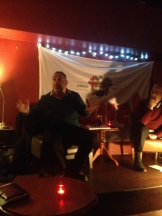
The speaker for this new event in our Distinguished Lecture series, Daniel Glaser, is one of the most qualified speakers to engage with the topic of (liberal) Arts and (natural) Sciences. He is a neuroscientist, but who started by studying first maths and English literature, before moving into brain imaging (fMRI and all that jazz) to study how prejudice and expectation shapes the world. And the intertwining continued, and in 2002 he was appointed as “Scientist in Residence” at the Institute of Contemporary Arts (ICA, London), and in 2014 he became the first scientist to sit on a Man Booker prize judging panel.
Through these movements between so many cultural field, Daniel became very aware of the importance of allowing the space and encouraging the movement towards interactions between people with different ways of seeing the world. In this lecture he will talk about the commitment to diversity as a leadership quality that is equally effective in promoting development both in arts as well as in sciences.
This cultural hopping brings it an interdisciplinary understanding. And here Daniel proposes an apparently paradoxical idea – interdisciplinarity is about ignorance. Ignorance and courage. The courage to cross the boundaries of your own discipline, and explore a different construct of the world and interact with people who are talking a different ‘language’. The courage to ask the ‘stupid questions’ which many a times are opening a different perspective. And what would be more interdisciplinary than a dialogue between the arts and sciences, and so much that each could benefit from each other.
Daniel will give the next talk in our LANS Distinguished Lecture Series, on Wed 21st Feb 2018 ((link here)). From its title: What kinds of energy are liberated when art and science collide? be prepared to witness intellectual fireworks and be challenged, maybe, in your preconceptions. And for that, you need to be there so please book your place (free entry) on eventbrite: here.
For the members of public outside the University of Birmingham, the lecture will take place in the Arts Main Lecture Theatre, on the first floor of the Arts Building (building R16 (red) on this map of the campus); for the disabled access further info can be found here. You can either drive to the Edgbaston campus of the University, or come with the train (there is a ‘University’ station – check the map).
contributed by Emil C. Toescu)


 n – and a
n – and a 




